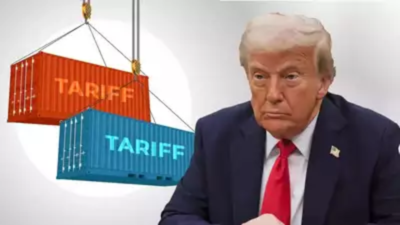- News
- Business News
- International Business News
- Trump tariffs offer hope for US small manufacturers, but uncertainty clouds outlook
Trending
Trump tariffs offer hope for US small manufacturers, but uncertainty clouds outlook
The Trump administration's tariffs have sparked debate among small US manufacturers. While some, like Marlin Steel Wire Products, anticipate growth due to fairer competition, others, such as Blanc Creatives and Rogue Industries, express concerns about economic instability and strained international relations. American Giant views the tariffs as a chance to revitalize domestic textile production after decades of globalization.
As the Trump administration doubles down on tariffs to shift global trade dynamics, small US manufacturers are divided — some see opportunity, while others warn that unpredictability may outweigh any potential gain.
Drew Greenblatt, president of Marlin Steel Wire Products in Baltimore, is among the strongest supporters. His company, which employs 115 workers across three states, makes wire baskets and racks for the aerospace, medical, and food processing sectors — all using American-sourced steel, as reported news agency AP.
Greenblatt argues that his company faces steep competition from foreign producers benefiting from long-standing trade advantages. In particular, he says European tariffs make it far costlier for German customers to buy US products than for Americans to buy imports from Europe.
“It’s wildly unfair to the American worker,” Greenblatt said. “And this has, by the way, been going on for decades.”
The Trump administration has labelled US manufacturing a national security and economic priority, aiming to reverse decades of decline. According to the Bureau of Labour Statistics, manufacturing employment in the US peaked at 19.6 million workers in 1979.
Tariffs, the administration argues, will incentivize more domestic production and lead to better-paying jobs for Americans in sectors like automotive, electronics, and household goods. Greenblatt is hopeful — he says achieving tariff parity with other countries could allow his company to double its workforce.
Rising concerns over economic instability
However, not all small business owners are convinced. For many, economic uncertainty sparked by the tariff policies is creating hesitation and anxiety.
Corry Blanc, founder of Blanc Creatives in Waynesboro, Virginia, manufactures artisanal cookware using American steel and wood. While he supports domestic manufacturing, Blanc is concerned about the unpredictable nature of the current trade landscape.
“There’s so much uncertainty and not a lot of direction,” he said, adding that his international customers are expressing concern. His company, which employs 12 staff members, lacks the infrastructure to suddenly ramp up production if demand increases.
Michael Lyons, owner of Rogue Industries in Maine, which makes leather wallets and accessories, echoed similar worries. His company uses domestically sourced leather and produces 80% of its goods in the US Despite this, he recently lost a long-time Canadian client due to cross-border trade tensions.
“Hopefully this will pass, and he’ll be able to come back,” Lyons said. “But it’s a real indicator of the friction these policies are causing.”
For now, Lyons has shelved expansion plans, saying, “It’s probably going to be, we hold with what we have.”
A push for reshoring American manufacturingStill, some entrepreneurs believe the tariffs could help reignite American industry. Bayard Winthrop, CEO of American Giant, a US-based clothing brand, says the country’s aggressive embrace of globalization over the past 40 years decimated domestic textile production.
In 1991, 56% of US apparel was made domestically. By 2023, that figure had plunged to below 4%, according to the American Apparel and Footwear Association.
Winthrop sources cotton from states like Georgia and North Carolina and manufactures his products in Los Angeles and North Carolina. He sees the current trade approach as a long-overdue effort to rebalance unfair trade with countries like China.
“The imbalances in textiles, especially with China, are shocking,” he said. “This could finally give domestic manufacturers a fighting chance.”
Winthrop acknowledges concerns about the Trump administration’s unpredictable policymaking, but urges Americans to focus on the long-term vision.
“The idea that we’re going to be more protective of our domestic marketplace and have an industrial policy that includes manufacturing jobs is not new,” he said. “It’s an old idea — and it’s one worth revisiting.”

About the Author
TOI Business DeskEnd of Article
Follow Us On Social Media

















